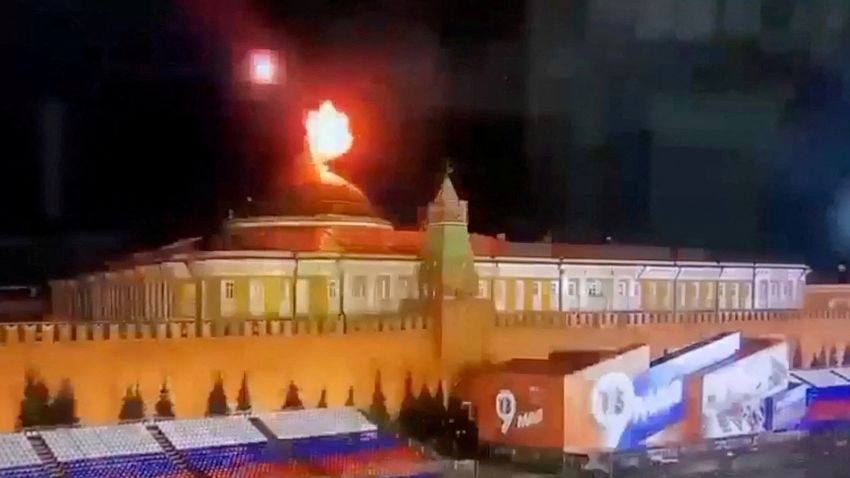Editor’s Note: Frida Ghitis, a former CNN producer and correspondent, is a world affairs columnist. She is a weekly opinion contributor to CNN, a contributing columnist to The Washington Post and a columnist for World Politics Review. The views expressed in this commentary are her own. View more opinion on CNN.
The announcement was dramatic and the images breathtaking. The Kremlin declared that it had come under attack on Wednesday night, targeted by two drones whose objective it claimed was to assassinate Russian President Vladimir Putin, who was unharmed.

Moscow accused Ukraine of what it called a “terrorist act.” Ukraine said it had nothing to do with whatever it was that took place that night. (The following day, the Kremlin also accused the US of involvement in the alleged attack, which the US denies).
Video clips on social media showed what looked like drones and a fiery explosion over the Kremlin, its walls already festooned with banners ahead of the May 9th celebration of Victory Day, when Russia commemorates its triumph over Nazi Germany in World War II and displays its military might with parades.
What exactly happened over the presumably heavily fortified Kremlin – a word that means fortress in Russian – the seat of government and home to the president?
Russia’s credibility, particularly concerning its war against Ukraine, has been crushed by its persistent lies. Still, we do not know what occurred.
Speaking during a trip to Finland, Ukrainian President Volodymyr Zelensky rejected the Kremlin’s accusation. “We don’t attack Putin or Moscow,” he said, “we fight on our territory.” Ukraine, he added, is leaving Putin’s fate to the tribunal, likely referring to the International Criminal Court, which has already issued an arrest warrant for the Russian president on allegations of war crimes.
Earlier, a spokesman for Zelensky rejected any claim that Ukraine would try to kill Putin. “It’s a trick to be expected from our opponents,” said Serhiy Nykyforov, accusing Moscow of deliberately “escalating the situation ahead of May 9th.”
Zelensky’s advisor Mykhailo Podolyak said such an attack would be counterproductive for Ukraine, giving Russia a justification for mass attacks. Instead, he argued, the incident was staged by Russia to create a distraction and seize the initiative.
Another possibility is that the attack was carried out by Russians opposed to Putin. A former Russian legislator, now exiled, told CNN that’s precisely what happened. “It’s one of Russian partisan groups,” Ilya Pomarev said, “I cannot say more, as they have not yet publicly claimed responsibility.”
If that is the case, expect Putin’s crackdown in Russia to intensify.
While uncertainty about the event continues, there’s one fact beyond doubt: with every passing day, the war in Ukraine moves closer to a major escalation.
The ground is still muddy as the winter snow melts; the temperature is rising. Ukraine has announced repeatedly that it’s planning a large-scale counteroffensive, a push to retake Ukrainian territory captured by the Russian occupiers.
Russia is nervous about this new imminent stage of the war. And, frankly, Ukraine’s allies are, as well.
Ukrainian forces surprised not only Russia but their friends with their fierce defense, holding their own in a conflict that many expected they would lose in a matter of days. But defending territory is different from retaking land that has already been captured, especially when Russia has had months to fortify its positions.
A trove of highly classified Pentagon materials that was recently leaked included pessimistic assessments of Ukraine’s ability to press an offensive, with one analysis warning that “Russia’s grinding campaign of attrition in the Donbas region is likely heading toward a stalemate.”
The tone of the analysis is at odds with the upbeat assessments coming from London and Washington. Still, those documents appear to date to February and March, so the analysis may have changed.
The cost of a failed, or even only minimally successful operation would not only be in lives lost. In addition to the carnage, it could end up dashing Ukraine’s hopes for retaining its territory.
Ukraine has been building up for what it hopes is a campaign that transforms the war and gives it the upper hand. If that doesn’t happen, its supporters in the West could lose patience and demand that Kyiv make concessions to Moscow.
For now, Ukraine’s allies have been pouring in military resources. So far, Ukraine has proven their initial pessimism wrong. But some are still worried that the fighting forces, electrified with the importance of their mission – saving their country – are being overly optimistic.
Russia has also been strengthening its defenses in anticipation of Ukraine’s assault. Ukrainian soldiers would contend with heavily mined fields, deep anti-tank ditches and trenches. Satellite images confirm Russia has built hundreds of miles of fortifications in areas where Ukraine is expected to attack, from the east and across the south toward Crimea.
It all adds up to a rising level of nervousness ahead of a season of intensified combat. It is against this backdrop that the Kremlin accused Kyiv of trying to assassinate Putin.
The incident is mysterious. Would the image-conscious Putin deliberately show the mighty Kremlin compound is so vulnerable? Would Ukraine gamble on a decapitation strike?
The Kremlin is so uneasy about what lies ahead, that the Victory Day celebrations have been scaled back sharply across the country. The bleachers are already going up in Red Square, but the celebrations will be very different this year.
Get our free weekly newsletter
Citing security concerns, authorities have cancelled some of the most moving traditions for this May 9th, including large gatherings and parades honoring those who died in Russia’s wars. In the Immortal Regiment parade, hundreds of thousands of Russians take to the streets, many holding up photographs of their relatives who served the nation in World War II, the Great Patriotic War, as it is known there.
That event will not happen this year. Some observers say the real reason it was cancelled is that the Kremlin fears that large public gatherings could turn into protests, and worry that the photographs of dead soldiers carried by relatives will show the tens of thousands of Russians killed in recent months fighting in Ukraine – underscoring the cost of the so-called “Special Military Operation,” Russia’s invasion of Ukraine that Putin at long last called a “war.”
Fourteen months after Russia launched its full-scale invasion, the war in Ukraine is already the worst on European land since World War II.
Whatever happened in the night skies over Moscow is yet another sign that this will be a very hot spring in Ukraine, with fighting entering a new and more intense phase, which could determine the outcome of this terrible war.





